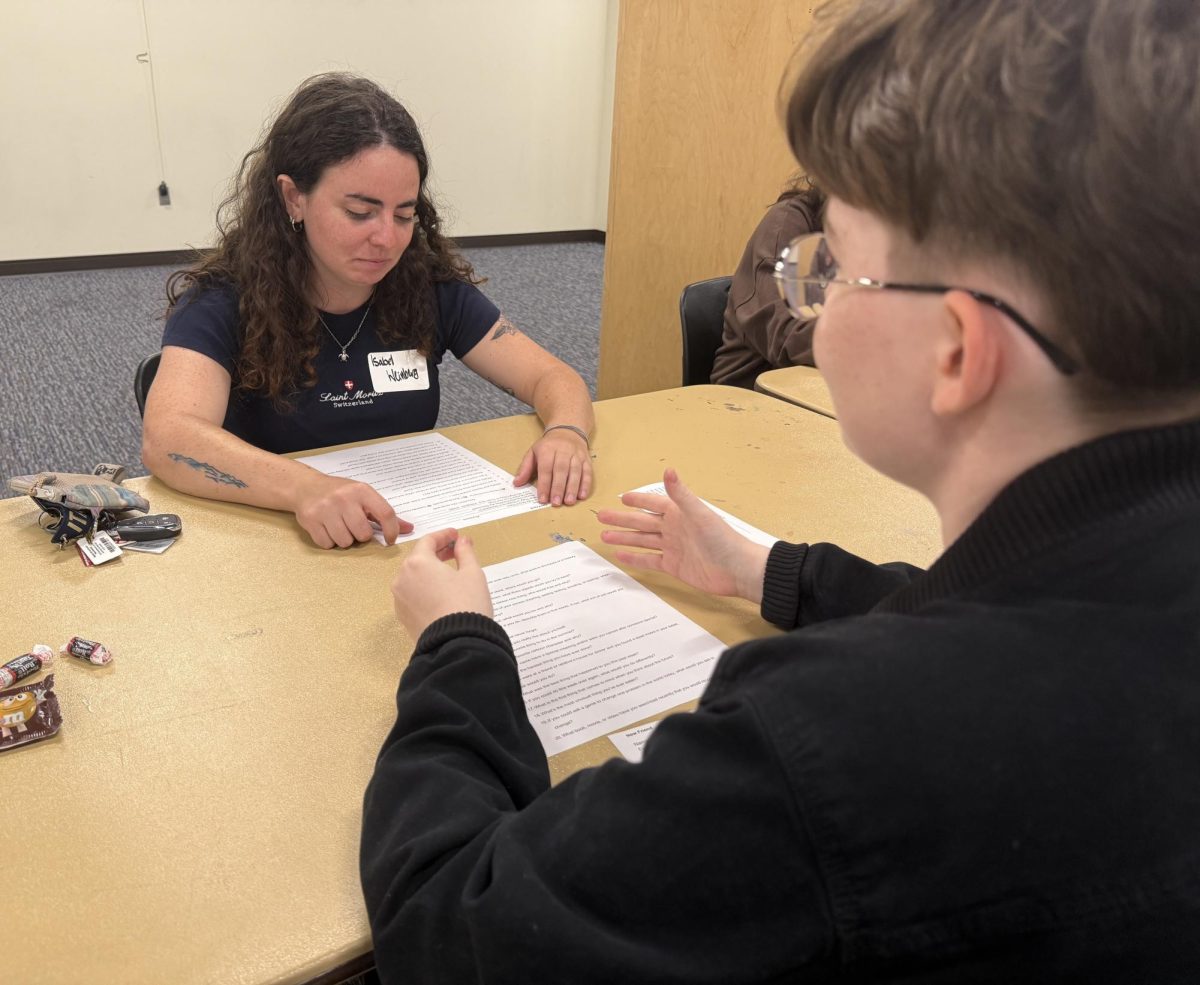Shelly Garzon
News Writer

Hispanic student Gabi Frias expresses her concern on the low number of minorities on campus.
[email protected]
UNC Asheville Latinx students say the university did not do anything to target them specifically to come to the university.
“I don’t remember ever being reached out by the school,” said Hispanic sophomore Gabi Frias. “I heard about it from a friend and academically it had everything I was looking for.”
According to university officials, the Hispanic population consisted of 122 students in 2009, just 3.3 percent of the total population. Now, a decade later, it’s numbered at 282 students, up to 7.7 percent.
Although the population has doubled, students still don’t see a true representation of the Hispanic community on campus.
“It’s fairly easy to tell in a classroom setting or at work that there are not very many minority or Hispanic people,” Frias said. “I’m the only minority here in the mailroom, and as far as I know there’s maybe only one other person of color who works at the guest service desk.”
The lack of a Hispanic community at UNCA leaves students feeling as though they cannot relate to anyone.
“I don’t have many Hispanic friends or people I can relate to,” Frias said. “I came from a very diverse high school. Now, its dropped drastically in which I only have like maybe two or three friends that are minorities, but even then they’re not Hispanic.”
In the last decade the university’s Hispanic population increased 4.4 percentage points.
“Those numbers don’t really surprise me,” said Hispanic, Asheville resident Renato Munoz. “The reason being is the Latino community might not be as prominent in North Carolina as it is in other states. This would probably make UNCA a lesser known college for a large Hispanic population.”
Students say the university could do more to create a sense of community for Hispanics on campus.
“I feel like we can do more to get involved,” said Kathia Beyhaut, president of Prospanica, a Hispanic organization. “If you start from before people even commit that can help people’s decision.”
According to university officials, there are two Hispanic student organizations on campus, Hermansx Orgullosxs en La Americas and the recently added Prospanica.
The organizations say they hope to promote understanding, justice and change for the Latinx community, socially and academically.
According to students, the university does not promote its cultural organizations very much, if at all.
“I didn’t even know that there were Hispanic organizations on campus up until this semester or what they were even called,” Frias said.
Students argue that when Hispanic culture is advertised it’s not done in a diverse way.
“It’s cool to have representation on campus but I would love to see things outside of just Mexican culture,” Frias said. “A lot of the stuff you see is very Americanized. There’s a Hispanic Heritage Month and I would love to see things take place then because it seems like no one really knows about it.”
Members of the community said the university can do things to potentially increase the number of Latinx students at UNCA.
“Maybe having a more diverse faculty could help,” Munoz said. “A faculty that would understand students and the struggles they go through with being a minority race at an institution.”
In the last decade the university’s Hispanic faculty and staff increased 188.8 percent, according to officials.
“When I first got here it was striking to see how low the number of Hispanics there were here at UNCA,” said professor of Spanish Michelle Battencourt. “I don’t think there was anyone that wasn’t white in our department, we had one native speaker and the rest of us were from the states.”
The Hispanic faculty population consisted of nine people in 2009. Now,10 years later, 26 Hispanic individuals serve as faculty members.
“Since I’ve been here since 1999 I have seen a huge increase at UNCA in diversity,” Battencourt said. “Still, I know that the number of Hispanics in faculty and staff is low and we are probably the department that has the most diversity and the most Spanish speakers.”
According to faculty and staff, there have been many benefits since the increase of the Hispanic population, not only for them, but also for students.
“For me as a professional, it has been beneficial to work with people with different perspectives and different backgrounds, but more than anything for our students,” Battencourt said. “I think about the experience our students were having back in 1999 versus now, where they can take classes with people from diverse parts of the world.”
Faculty and staff say the university needs to do more in order to increase the Hispanic population.
“UNCA wasn’t doing anything. There was a point when I went around to local festivals and set up a table,” Battencourt said. “They are starting to have more of a presence, but they need to do more. They need to do advertisements in local Spanish speaking magazines and newspapers. I think they can have a presence at all the festivals and let people know about our programs and what we offer.”
The University offers a program called ¡Vamos!, which solely supports the Latinx community, officials said.
“They offer after school tutoring in English or Spanish for students who are struggling in their classes,” said Battencourt. “They also do an evening workshop series for the students and their families about how to apply for college and grants. They give families an orientation of what life is like for college students.”
According to volunteers of the program, ¡Vamos! offers a three-day summer camp where the students in the program come to campus, stay overnight in the dorms, participate in activities and get a feel for life at UNCA.
Officials say having a more diverse faculty and staff can help provide a sense of community for Hispanic students.
“They can recruit and bring in more Latinx communities,” Battencourt said. “But then if students are here and they don’t feel like they have any faculty, staff, resident assistants or anyone in administration that they can relate to or share a common history with, it’s not going to do any good because those students aren’t going to stay necessarily for four years.”
Battencourt said the university can run a needs assessment in the community to find out what Latinx students are interested in studying and needs the community has that UNCA does not currently offer and incorporate that into the curriculum.
The university seeks to recruit students that will strengthen the mission and core values, according to the university’s mission statement.
“The university recruits students who demonstrate a high-caliber academic background and a commitment to the educational curiosity that makes the academic environment thrive so well,” said former senior director of Admissions and Financial Aid Steve McKellips. “Those high-caliber students are diverse in many ways that include, but are certainly not limited to racial or ethnic backgrounds. UNC Asheville continues to prioritize the importance of diversity across a wide array of factors.”
Officials say UNCA students, within a diverse and inclusive community, experience a liberal arts education at its best.
“Continued growth in diversity is very important to UNC Asheville because diverse ways of thinking is inherently an asset to our liberal arts and sciences commitment,” McKellips said. “Having diverse opinions continues to influence the learning patterns of others.”






















